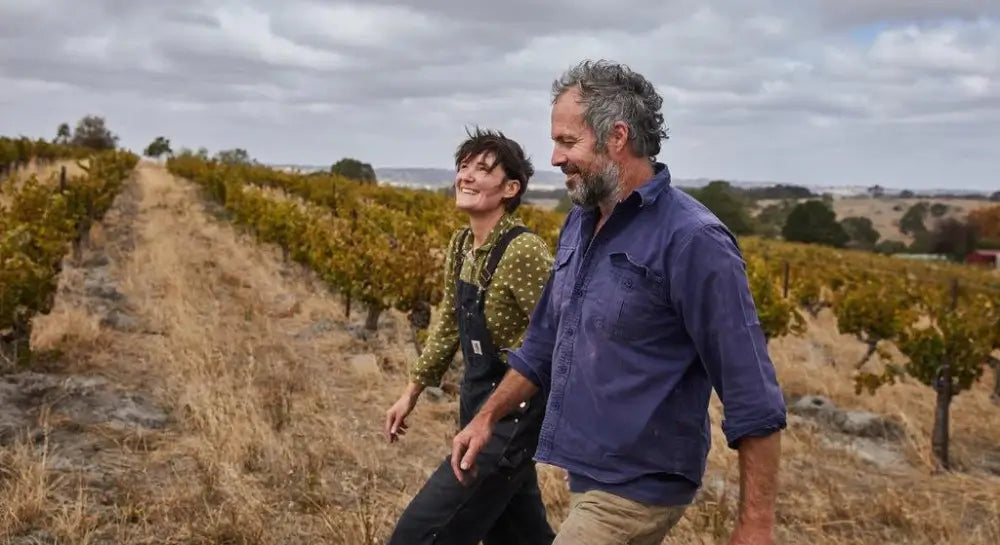Ruggabellus, translated as 'rugged beauty', captures the wild spirit of the Barossa Valley like no other winery. It’s the project of Abel Gibson and his wife Emma. Abel has deep ties to his home region and innovative mindset that have led him to create wines that redefine Barossa’s possibilities.
Raised amidst the iconic cellars of Penfolds and Rockford, Abel's upbringing was steeped in the culture of the Barossa. With influences like Charlie Melton and his father, Rob Gibson, it was almost inevitable that Abel would carve out a unique path with Ruggabellus—one that’s part homage, part reinvention.

Abel Gibson moved to the Barossa when he was just two, and as he puts it, he has "no recollection of life before this place." Growing up, he experienced the heady aromas of Penfolds cellars and absorbed the rhythms of viticulture that came as second nature to his family. Yet, despite this almost fated connection, Abel’s journey wasn’t about blindly following tradition. He embarked on a personal odyssey that took him far from Barossa’s gumtrees and sun-baked soils. It was this journey that brought him back, eyes open and heart full, ready to contribute his own voice to the region.
Gibson’s approach is shaped by a mix of experience and instinct. He worked alongside some of the Barossa’s most revered figures—Penfolds, Rockford, Chris Ringland, Charles Melton, Spinifex—taking on their lessons and interperating them for himself. With no formal training as a winemaker, his is a style that relies on feel—on knowing when the grapes are just right, on blending by intuition. It’s the kind of winemaking where you’re always learning, always adapting, but you’re never copying.

Ruggabellus wines are as much about what they aren’t as what they are. They aren’t about the bombast that Barossa wines are sometimes known for. They aren’t about heavy-handed oak or overripe fruit. Instead, they’re about lightness, freshness, and an almost ethereal kind of beauty. Abel tends to pick his fruit early, aiming for wines that are succulent and invigorating—perfect for sharing with friends at the dinner table. The reds often involve whole bunch fermentation, which brings a spiciness and lift to the wines, while the whites—often a blend of Riesling, Muscat, and Semillon—undergo extended skin contact, resulting in world-class amber wines of remarkable complexity.
Oak is never new at Ruggabellus; instead, it’s there in the background, letting the old vine Grenache, Mataro, Syrah, and Cinsault speak. The aim is to preserve vitality—freshness and crunch, a sense of place that doesn’t get lost in the noise of winemaking intervention. It’s a practice that follows the moon, quite literally, with biodynamic principles influencing picking, racking, and bottling decisions.

The wines themselves are enchanting and demand patience. They can be taut, even a bit reductive, when first opened. Abel believes in making wines for the long haul, and these bottles reveal their layers over days. The whites are some of Australia’s finest examples of amber wine. They’re complex, aromatic, and other-worldly, offering an authentically Australian interpretation of skin-contact winemaking.
"So if you want to look at the most considered and best orange wines in the country, well, here you go."Ruggabellus was launched in 2011 with the 2009 vintage, and by 2013, Abel and his wife Emma had taken another big step: purchasing a 2-hectare vineyard in Flaxman’s Valley. This vineyard, carefully nurtured back to health, now forms part of the patchwork of sites they use to craft their wines.
- Mike Bennie (The Wine Front)

And that’s part of the magic of Ruggabellus: it’s not just about one vineyard or one approach. It’s about complexity, about combining different sites, different varieties, different techniques. Abel’s wines are like a mosaic of the Barossa, each piece contributing to a more intricate whole.
For Abel, wine is about grace and intrigue. He’s set out to explore the uniquely Australian character of his wines—finding beauty in restraint, and ruggedness in the land he calls home. Whether it’s the aromatic lift of his early-picked reds or the deep, savoury tang of his skin-contact whites, each bottle of Ruggabellus is a love letter to the Barossa—a reflection of the land Abel loves and the unique vision he brings to it.


